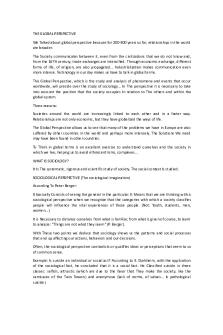The behavioral perspective PDF

| Title | The behavioral perspective |
|---|---|
| Author | quebo cabe |
| Course | Abnormal Psychology |
| Institution | University of Lethbridge |
| Pages | 2 |
| File Size | 54 KB |
| File Type | |
| Total Downloads | 43 |
| Total Views | 146 |
Summary
The behavioral perspective...
Description
The behavioral perspective
Study of directly observable behavior Central theme is learning Classical conditioning: Pavlov-> conditioned stimulus begets a conditioned response. A formerly neutral stimulus acquires the capacity to elicit biological responses. CS stimuli are well maintained over time but it gradually fades-> extinction. Operant conditioning: learning how to achieve a goal. Reinforcement-> delivery of reward or pleasant stimulus or the removal of an aversive stimulus. Generalization: When a response conditioned to one stimulus can also be evoked by other, similar stimuli Discrimination: When a person learns to distinguish between similar stimuli and respond differently to them Observational learning: Learning through observation alone, without direct experience.
Cognitive-behavioral perspective
Focuses on cognitive processes and their influence on behavior-> how thoughts and information processing can become distorted and lead to maladaptive emotions and behavior. Schema = underlying representation of knowledge that guides the current processing of information and often leads to distortions in attention memory and comprehension. We have schemas about the world and self-schemas. The schemas are often based on unconscious assumptions, they are not representations of reality. New information has to be assimilated, fitted into the old schemas. Accommodation means that old schemas are adjusted to incorporate new in the formation (goal of therapy). Self-schemas: who we are, what we can become, what is important to us, the roles we play Attribution theory: Studies how people assign causes to things that happen (internally, externally). Through an attribution style: a characteristic way in which an individual tends to assign causes to bad events or good events. Cognitive therapy: How best to alter distorted and maladaptive cognitions? Assimilation: clinging to what we know and reject/ distort new views that are not in line with it Accommodation: changing our framework to make new information fit
Social perspective
Psychosocial causal factors:
o Early deprivation or trauma: abuse, dysfunctional families, separation from parents-> insecure attachment o Inadequate parenting styles: warmth (support, encouragement, affection vs rejection and hospitality) and control (monitoring vs no supervision). Styles: authoritative (high warmth, moderate control-> well-adjusted children), authoritarian ( low warmth, high control-> children conflicted, irritable, low social skills), permissive (high warmth, low control-> children selfish, spoiled, arrogant, impulsive and aggressive) and uninvolved (low warmth, low control-> children w no self-esteem, moody, conduct problems, academic and social failings) o Marital discord and divorce
o Maladaptive peer relationships (bullying)
Cultural perspective The cultural perspective is concerned with the impact of culture on the definition and manifestation of mental disorders. Research supports the view that many psychological disturbances—in both adults and children—are universal, appearing in most cultures studied. Although some universal symptoms and patterns of symptoms appear, sociocultural factors often influence which disorders develop, the forms they take, how prevalent they are, and their courses.
SUMMARY
Causes: necessary, contributory, sufficient factors, proximal and distal Diathesis and stress Biological: genetics, brain dysfunction and neural plasticity, neurotransmitter and hormonal imbalance and temperament Family history, twin method, adoption method, linkage method, association studies Freud- psychoanalysis, id, ego and superego Object-relations theory, attachment theory Classical conditioning, operant conditioning, observational learning Schemas and self-schemas Three social factors: early deprivation and trauma, parenting style, marital discord, maladaptive peer relationships, prejudice, low socioeconomic status and unemployment...
Similar Free PDFs

The behavioral perspective
- 2 Pages

The Altered Perspective
- 6 Pages

THE Global Perspective
- 38 Pages

Chapter 4 The Trait Perspective
- 20 Pages

Behavioral Accounting
- 10 Pages

Konseling behavioral
- 19 Pages
Popular Institutions
- Tinajero National High School - Annex
- Politeknik Caltex Riau
- Yokohama City University
- SGT University
- University of Al-Qadisiyah
- Divine Word College of Vigan
- Techniek College Rotterdam
- Universidade de Santiago
- Universiti Teknologi MARA Cawangan Johor Kampus Pasir Gudang
- Poltekkes Kemenkes Yogyakarta
- Baguio City National High School
- Colegio san marcos
- preparatoria uno
- Centro de Bachillerato Tecnológico Industrial y de Servicios No. 107
- Dalian Maritime University
- Quang Trung Secondary School
- Colegio Tecnológico en Informática
- Corporación Regional de Educación Superior
- Grupo CEDVA
- Dar Al Uloom University
- Centro de Estudios Preuniversitarios de la Universidad Nacional de Ingeniería
- 上智大学
- Aakash International School, Nuna Majara
- San Felipe Neri Catholic School
- Kang Chiao International School - New Taipei City
- Misamis Occidental National High School
- Institución Educativa Escuela Normal Juan Ladrilleros
- Kolehiyo ng Pantukan
- Batanes State College
- Instituto Continental
- Sekolah Menengah Kejuruan Kesehatan Kaltara (Tarakan)
- Colegio de La Inmaculada Concepcion - Cebu









